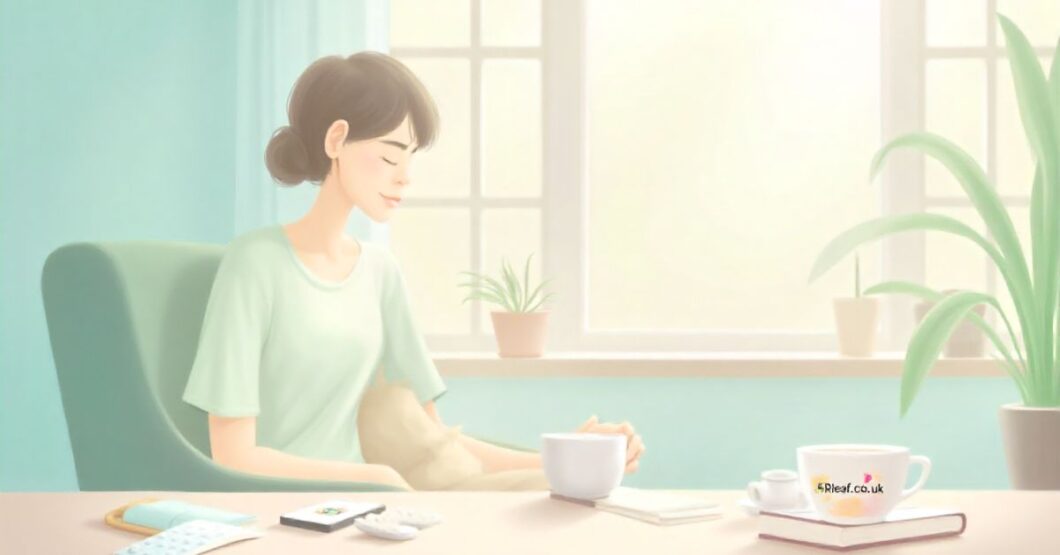Introduction
Have you ever felt like your heart is racing for no reason… or your brain just won’t switch off, even when nothing’s actually happening? If yes, you’re absolutely not alone.
In fact, over 8 million people in the UK are dealing with some form of anxiety right now. And while occasional stress is just part of being human, ongoing anxiety can take a toll — mentally, emotionally, and physically.
That’s why it’s so important to get the right support. Whether you’re exploring therapy, lifestyle changes, or anxiety medication through Releaf.co.uk, understanding your options is the first real step toward feeling better.
This isn’t about quick fixes. It’s about equipping you with safe, expert-backed tools to manage anxiety in a way that suits you. Let’s navigate this journey together.
What Anxiety Really Feels Like
We all feel anxious from time to time. A job interview, a big move, or a tough conversation — these are moments when anxiety actually helps us focus.
But for many, that “nervous” feeling turns into a daily, exhausting burden. You might be constantly on edge, have racing thoughts, feel tight in your chest, and start avoiding people or places — even the supermarket or your best friend’s party.
Here’s when anxiety might need medical attention:
- It’s been going on for six months or more
- You often feel like something awful is going to happen — without any real reason
- You find it hard to sleep, focus, or eat regularly
- You’re physically unwell, but nothing shows up in tests
Whether your anxiety feels like a constant buzz or sudden waves of panic, there’s help out there. And understanding how your body responds is the first step.
How Anxiety Shows Up in Your Brain and Body
Anxiety doesn’t just mess with your mind — it shows up in your entire body.
| Body System | How Anxiety Affects It |
|---|---|
| Brain | Overactive fear centres, racing or looping thoughts |
| Heart and Blood Vessels | Increased heartbeat, heart palpitations |
| Stomach and Gut | Nausea, bloating, IBS symptoms |
| Muscles | Tension in the neck, shoulders, or jaw |
| Hormones | High cortisol (stress hormone), fatigue |
Over time, untreated anxiety can even wear down the immune system and raise your risk of other health issues. That’s why it’s not “just in your head” — it’s a full-body experience that needs real care.
What Kinds of Medication Are Available in the UK?
Let’s make this simple.
There are a few different types of medication your doctor or prescriber might recommend, and they each work a little differently.
Most common anxiety medications in the UK:
| Type | How It Helps | Good To Know |
|---|---|---|
| SSRIs | Boost serotonin (feel-good hormone) | Most commonly prescribed & safe for long-term use |
| SNRIs | Boost serotonin and norepinephrine | Usually for general or social anxiety |
| Benzodiazepines | Calm system down quickly | Work fast but can be addictive, so short-term only |
| Beta Blockers | Reduce physical symptoms like trembling | Often given for public speaking or performance anxiety |
Some people start with natural options first. Others may jump straight to prescriptions if anxiety is more severe. It’s about finding what suits you.
Is Prescription Medication Right for You?
Choosing to take medication is deeply personal. No one can (or should) pressure you into it — but it’s important to know when it might help.
Medication might be a good option if:
- You’re having panic attacks or frozen moments regularly
- Your anxiety is interfering with work, school, or parenting
- You’ve tried therapy and lifestyle changes, but the anxiety still sticks around
- You’re feeling physically unwell from worry (e.g. chronic stomach upset, insomnia)
Working with a platform like Releaf.co.uk makes it easier to explore your treatment options in a private, judgment-free way.
Natural and Non-Prescription Alternatives
Not everyone needs (or wants) medication. In fact, mild anxiety often improves through a mix of natural changes and gentle supplements.
Here are some tried-and-tested natural supports:
- L-Theanine (found in green tea): Helps ease racing thoughts without drowsiness
- Magnesium: Supports nervous system regulation
- CBD (Cannabidiol): Shown to calm anxiety and support sleep
- Ashwagandha: A plant that helps lower cortisol levels
- Chamomile or grey tea: Great for naturally calming nerves
Just keep this in mind: Natural doesn’t always mean risk-free. Always check with a pharmacist before combining these with medication.
How Releaf.co.uk Can Actually Help
This isn’t just another health site. Releaf.co.uk is leading a new wave of personalized, digital-first care in the UK. If you’ve ever felt too anxious to get to the doctor — this is for you.
Here’s what Releaf offers:
- UK-licensed prescribers to guide your journey
- Discreet, secure delivery of MHRA-approved anxiety medication
- Personalised care plans, based on your symptoms and concerns
- Ongoing support and mental health content designed around you
Exploring anxiety medication Releaf.co.uk through their platform is designed to feel as easy as ordering a book — not like walking into a busy clinic with your heart pounding.
What to Expect When You Start Medication
When you first start anxiety medication, you might not feel instant relief — and that’s normal.
Here’s a typical timeline so you know what to expect:
What usually happens in the first few weeks:
| Week | What You May Feel |
|---|---|
| 1–2 | Side effects like mild nausea or drowsiness |
| 2–3 | Possible “dip”—occasional spikes in anxiety or mood |
| 4–6 | Stabilisation—less worrying, improved sleep, calm mind |
If anything feels “off,” reach out to your prescriber. Adjustments are common and totally okay. The most important thing is not to stop abruptly unless guided to.
Understanding Side Effects and Safety
Like any medical treatment, anxiety meds can cause side effects — especially in the early days. The key is not to panic and to know what’s likely versus rare.
Common side effects:
- Dry mouth
- Upset stomach or diarrhoea
- Feeling tired or a bit “flat”
- Sexual side effects
- Slight weight changes
These usually pass within a few weeks. Serious reactions like intense mood shifts, or suicidal thoughts, are less common but must be addressed immediately with your doctor.
Tip: Don’t drink a lot of alcohol while on anxiety meds — it can mute or worsen effects.
Combining Medication with Therapy and Lifestyle
Medication can help level the playing field — but healing often happens faster when combined with other supports.
Things that work beautifully with medication:
- CBT (Cognitive Behavioural Therapy): Deal with the root of anxious thoughts
- Daily movement: Walking, yoga, or light gym can lift your mood
- Breathwork and meditation: Calm the nervous system naturally
- Sleep hygiene: Respect your need for rest
And don’t forget community — a trusted person to talk to makes a huge difference.
What the Future Holds for Anxiety Care
2025 is an exciting time for mental health treatment. Here’s what’s new or in the works:
- Digital health platforms (like Releaf) leading new pathways to care
- AI-powered mood tracking apps to fine-tune treatment
- Psychedelic-assisted therapy for trauma and resistant cases (still clinic-only)
- At-home mental health testing kits for hormones and brain health markers
Old stigma is making way for real science and real stories. If you’re starting this journey now — you’re ahead of the curve.
Most Used Medications for Anxiety in the UK – Quick Glance (2025)
| Medication | What It Does | % Use (2025 data) |
|---|---|---|
| Sertraline | Balances mood, reduces anxious thoughts | 37% |
| Citalopram | Helps with general anxiety & worry | 16% |
| Venlafaxine | Calm + energy: works on 2 brain systems | 12% |
| Propranolol | Physical calm (heart rate) | 10% |
Source: NHS Quarterly Prescribing Summary, 2025
FAQs
Is it safe to take anxiety medication long-term?
Yes, many people take SSRIs for 6 months to years safely under GP guidance.
Can I get anxiety medication from Releaf.co.uk?
Yes, they work with licensed UK providers who can prescribe if appropriate.
What’s the best med for fast relief?
Benzodiazepines work fast but are usually short-term only.
Can I mix natural remedies with meds?
Some you can, some you can’t. Always check with your pharmacist first.
What if I want to come off anxiety meds?
Tapering off slowly with professional support is the safest approach.
Conclusion
If you’re here, chances are you’ve been carrying a lot for a long time. And it’s okay to say, “I need help.”
Whether you’re considering supplements, therapy, or exploring anxiety medication through Releaf.co.uk, the most important thing is that you’re taking action. And that takes real strength.
You don’t have to fix everything overnight. You just have to take the first step.




